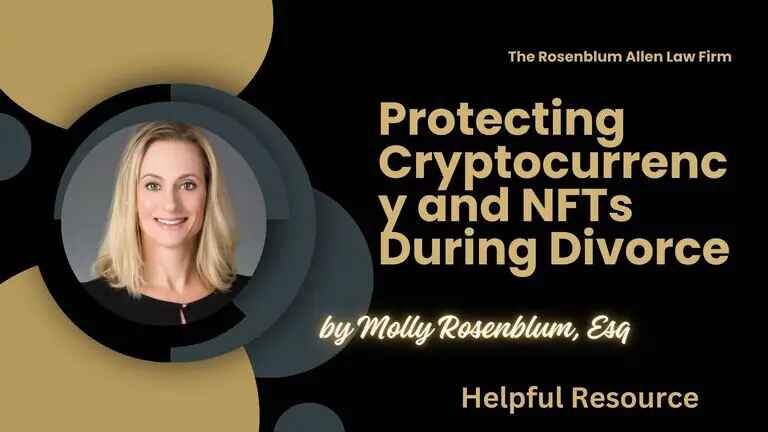Understanding Crypto and Divorce in Nevada: A Comprehensive Guide
Welcome to the bright lights and significant decisions of Las Vegas, where real-life dramas unfold alongside the famous Strip, especially when it comes to divorce. In the Silver State, where marriage and divorce laws are as unique as the landscape, we’re seeing a new player in town: cryptocurrency. It’s digital, it’s decentralized, and it’s increasingly part of asset division in divorces.


Cryptocurrency, or ‘crypto’ for short, might seem like a game of high-stakes poker, but it’s genuine and can significantly impact your divorce. Whether you’re a crypto enthusiast or discovering that ‘Bitcoin’ isn’t a new casino, understanding how it fits into your divorce is crucial.
Basics of Cryptocurrency
Before we dive into the nitty-gritty, let’s make sure we’re all on the same page about what cryptocurrency is:
- Cryptocurrency: A digital or virtual money that uses cryptography for security. It’s decentralized and doesn’t rely on banks or traditional financial systems.
Here’s a quick rundown of the crypto basics:
- Bitcoin: The first and most well-known cryptocurrency.
- Ethereum: Another popular type of crypto known for its smart contract functionality.
- Wallets: Where you store your cryptocurrency. They can be digital apps or physical devices.
- Exchanges: Online platforms where you can buy, sell, or trade cryptocurrency.

Cryptocurrency and Marital Assets
In Nevada, the law likes to keep things fair when splitting up your stuff in a divorce. But how does this work with crypto? Well, it’s all about figuring out if your crypto is marital property or separate property:
- Marital Property: Stuff you and your spouse got while you were married. This is usually split between both parties.
- Separate Property: Stuff you had before you got married or received as a gift or inheritance. This usually stays with the person who owns it.
So, where does crypto fit in? If you bought or mined it during your marriage, it will probably be considered marital property. But if you had a Bitcoin wallet before you said “I do,” it might be separate property.
Valuation of Cryptocurrency in Divorce
One of the trickiest parts of dealing with cryptocurrency in divorce is figuring out what it’s worth. Crypto values can swing wildly from one day to the next, making it a roller coaster ride when trying to agree on a deal.
Here are the main challenges:
- Volatility: Crypto prices can change fast, meaning the value when you start your divorce might differ significantly from when you finish.
- Valuation Date: Deciding on the specific crypto value date can make a big difference.
- Experts: Sometimes, you must bring in a financial expert who understands the crypto market to give an accurate valuation.
To wrap your head around the value, you’ll need to look at things like:
- The amount of cryptocurrency you have.
- The current market value.
- The history of the value over time.
Understanding these basics lays the groundwork for navigating through the complexities of crypto in your divorce. You’re already taking the first steps toward making informed decisions, which is excellent! Hang in there, and remember, you’re not in this alone.

Breaking It All Down for You
In conclusion, if you face the complexities of divorce, remember you have a wealth of resources and professional guidance. When you’re ready to discuss your situation or take action, don’t hesitate to contact Molly Rosenblum and her dedicated team at The Rosenblum Allen Law Firm by calling (702) 433-2889. We are poised to assist you in navigating your next steps with experience and compassion.

Frequently Asked Questions
What happens if my spouse and I can't agree on the value of our crypto assets?
If you and your ex-partner can’t agree on the value of your cryptocurrency, a judge might order a professional evaluation. This means a financial expert who understands the crypto market will be brought in to give a fair estimate of what your digital coins are worth. The expert will look at the market value on a specific date and might even consider the potential for future value changes.
Can I keep my cryptocurrency if I owned it before getting married?
In Nevada, if you owned cryptocurrency before you got married, it’s generally considered separate property and not subject to division in a divorce. However, if the value of your crypto increased during the marriage, that increase might be viewed as a marital asset. It’s crucial to prove the original ownership and any changes in value throughout the wedding.
How is crypto divided if it was gifted to us during our marriage?
If the cryptocurrency were gifted to you and your spouse during your marriage, it would likely be considered marital property and subject to division during your divorce. Unless the gift was given explicitly to one of you with clear intent, the default assumption is it’s for both of you.
Is it possible to hide cryptocurrency from my spouse during a divorce?
While it’s technically possible to hide cryptocurrency due to its digital and somewhat anonymous nature, it’s illegal and unethical during a divorce. If discovered, hiding assets can lead to legal penalties, a loss of credibility in court, and potentially a more unfavorable division of other assets.
What should I do if I suspect my spouse is hiding crypto assets?
If you believe your spouse is hiding cryptocurrency, informing your lawyer is essential. They can use legal discovery tools to uncover hidden assets. This might involve hiring a digital forensic expert to trace and locate crypto transactions.
How do I ensure my cryptocurrency assets are secure during the divorce process?
To secure your cryptocurrency during a divorce, maintain strong security practices like using two-factor authentication, keeping your private keys safe, and not sharing sensitive information with anyone. Also, follow any legal instructions or court orders regarding your assets.
Do I need an exceptional attorney for a divorce involving cryptocurrency?
While you don’t necessarily need a “special” attorney, having a divorce lawyer with experience with cryptocurrency and understanding its complexities is beneficial. An attorney with this background can better navigate crypto assets’ valuation, division, and legal aspects in your divorce.
Can child support or alimony be paid in cryptocurrency in Nevada?
In theory, child support or alimony could be paid in cryptocurrency, but it’s not common practice and might not be legally enforceable in Nevada. Payments are usually made in U.S. dollars to ensure consistency and clarity in the amount due to currency value fluctuations.
What if my spouse purchased cryptocurrency with marital funds without my knowledge?
Purchases made with marital funds without your knowledge are still considered part of the marital estate. All assets, including secretly purchased cryptocurrency, must be disclosed during the divorce process and are subject to division.
Will the court split our crypto assets down the middle?
Not necessarily. Nevada is an equitable distribution state, which means the court splits marital assets in a fair but not always equal way. Like any other asset, the division of cryptocurrency will depend on various factors, including each spouse’s financial situation, contribution to the marriage, and future needs.
Additional Resources for You

As a reminder, our lead attorney, Molly Rosenblum Allen, Esq., has developed a range of informative resources to assist you during challenging times, especially concerning divorce and related matters. Here are some valuable resources for your reference:
Las Vegas Divorce Attorney: Navigate your divorce proceedings in Las Vegas with expert legal advice and support. Explore More
Alimony in Nevada: Understand the nuances of alimony laws and what to expect in the state of Nevada. Learn About Alimony
Divorce and Mortgage: Find out how divorce can impact your mortgage and what steps you can take to manage this situation effectively. Read About Divorce and Mortgage
Divorce and Taxes: Get informed on how divorce proceedings can affect your tax situation and plan accordingly. Understand Divorce and Taxes
Health Insurance After Divorce: Explore your options for health insurance coverage following a divorce. Learn About Health Insurance Options
Divorce and Bankruptcy: Navigate the complexities of handling divorce when bankruptcy is also a factor. Understand Divorce and Bankruptcy
Student Loan Debt Divorce: Learn how student loan debt is treated in the context of a divorce. Explore Student Loan Debt in Divorce
How Much is Alimony in Nevada?: Gain insight into the factors that determine alimony amounts in Nevada. Learn About Alimony Amounts
Divorce Attorney Fee: Understand the costs associated with hiring a divorce attorney and how fees are structured. Read About Divorce Attorney Fees
Who Gets the House in a Divorce in Nevada: Discover the legal considerations that determine who keeps the house in a Nevada divorce. Learn Who Gets the House
How to Not Get Screwed in a Divorce: Arm yourself with knowledge and strategies to protect your interests during divorce proceedings. Protect Your Interests
Molly Rosenblum Allen, Esq. is dedicated to providing detailed and supportive resources to help you navigate through these complex legal matters. Feel free to use these resources to understand your situation better and make informed decisions.

Offsite Resources You May Find Helpful
here are seven offsite resources that readers may find useful for information related to divorce proceedings, legal advice, and support:
American Bar Association: Provides a wealth of information on family law, including resources for finding legal representation and articles on the divorce process.
FindLaw: Offers a comprehensive selection of articles on divorce, legal separation, child custody, and more, helping you to understand your rights and obligations.
LegalZoom: While it’s a service that provides legal document preparation, its website also has helpful guides and articles on the divorce process.
National Association of Divorce Professionals (NADP): A network of professionals who work with those going through divorce. Their site offers insights and connections to various experts.
Psychology Today: Not only a resource for finding therapists but also has articles and resources on coping with the emotional aspects of divorce.
Avvo: Features an extensive directory of lawyers where you can search by practice area and location, alongside a Q&A forum and legal guides.
National Council of Juvenile and Family Court Judges (NCJFCJ): Provides a variety of resources related to family law, including publications on the impact of divorce on children and families.

A Special Message From Our Lead Attorney
Why You Might Need a Lawyer
Molly Rosenblum, Esq

Dear Reader,
Thank you for taking the time to explore our divorce resources. I hope you found the information insightful and empowering as you navigate this challenging time.
Understanding your options and rights is the first step in regaining control of your future.
If you’re ready to take the next step or have questions about your unique situation, my team and I at The Rosenblum Allen Law Firm are here to help.
You can contact us by calling (702) 433-2889. We are committed to providing you the guidance and support you need to move forward.
Warm regards,
Molly Rosenblum, Esq.


